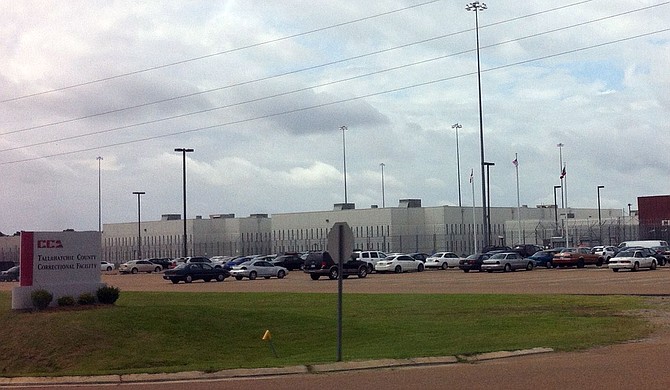The State of Mississippi may be paying more than state law allows to house inmates from the Mississippi State Penitentiary in the private-run Tallahatchie County Correctional Facility in Tutwiler, Miss., for 90 days amid an outbreak of deadly violence. Photo by WhisperToMe
Mississippi's emergency contract with a private prison corporation to house 375 inmates could exceed legal limits even more than previously known. Earlier this month, Mississippi agreed to house the inmates from the Mississippi State Penitentiary in Sunflower County to the Tallahatchie County Correctional Facility in Tutwiler, Miss., for 90 days amid an outbreak of deadly violence.
The State will pay more than $2 million to the CoreCivic corporation to house the inmates in Tutwiler during that period. Under state law, though, contracts with private prisons must come at least 10% under the per diem cost for State-run prisons. A PEER report last year found that Mississippi Department of Corrections spends $53.72 per diem at a "model state facility based on the average costs, security requirements, and medical needs of inmates housed in state operated facilities."
The contract with the Tutwiler prison would need to come in at $48.35 or under to meet the less-than-10% required by law. Instead, the State will pay more than $60 per prisoner per day under the emergency contract, which former Gov. Phil Bryant inked just before he left office earlier this month. The April 2019 PEER report noted that "state law requires that private prisons represent at least a 10% savings to MDOC's costs for the same level quality of services."
The base-level $53.72 that MDOC spends per prisoner includes $10.28 per day for medical costs. Under this month's agreement with the CoreCivic prison, though, the State would pay for any prisoner's off-site medical costs that exceed $2,500. CoreCivic would not be responsible for any costs associated with treating inmates for AIDS, HIV or Hepatitis C. That means that the per diem cost, which already exceeds $60, could potentially balloon even higher.
MDOC justified its decision to move the prisoners, saying it does not have enough staff to ensure the inmates' safety. Last year, the Mississippi Legislature rejected a request for a $7-million increase to raise pay for staff at State prisons in what would have been an attempt to recruit more employees to the low-paying positions. MDOC had more than 500 unfilled positions at its prisons last year.
On Sunday, MDOC confirmed that guards found an inmate hanging in his cell on Saturday at the Mississippi State Penitentiary, also known as Parchman Farm, marking the sixth death in a State prison in the past month and the third at the Sunflower County facility.
Last July, prison-reform advocates warned that the State's high rates of incarceration were contributing to the problem and creating dangerous conditions.
"Mississippi has a mass-incarceration problem," Interim Director of the American Civil Liberties of Mississippi Josh Tom said at the time. "Dramatic increases in imprisonment over the last 40 years have brought prisons and jails across the state to the breaking point. Changes in law and policy, not crime rates, explain most of this increase."
CoreCivic, previously known as the Corrections Corporation of America, operates other prisons in the State, too, including the Adams County Correctional Center in Natchez, and has long had prominent backers in the state including former Gov. Haley Barbour and a University of Mississippi journalism board member Charles Overby. The U.S. Immigration and Customs Enforcement agency is currently contracting with CoreCivic to hold hundreds of Hispanic and Latino undocumented immigrants, refugees, and asylum seekers at the facility in Adams County. That includes some of the hundreds of Mississippi poultry plant workers whom ICE detained following its massive August 2019 worksite raids.
Refugees Locked Up In Mississippi: ‘Family Values?’
Private prisons in Mississippi used to house immigrants who committed felonies; now they're housing refugees. Ashton Pittman reports.
MDOC did not respond to a request for comment by press time. A spokeswoman for CoreCivic emailed today to say: "In deference to our government partner, questions regarding contracts should be directed to the Mississippi Department of Corrections."
In a Jan. 9 statement, CoreCivic President and CEO Damon Hininger said the company was "pleased to assist the state of Mississippi due to significant challenges in their correctional system."
"Situations like this exemplify how critically important it is for state and federal partners to have access to our real estate assets and associated service offerings," Hininger said. "Our Tallahatchie facility will provide immediate capacity for the state to move a portion of their close custody inmate population, which will quickly improve the safety and security of their entire correctional system. Without the private sector there would be no immediate alternative solution available to the state."
Read more about Mississippi's prison crisis at jacksonfreepress.com/prisons. Follow Reporter Ashton Pittman on Twitter @ashtonpittman. Send tips to [email protected].
More stories by this author
- Governor Attempts to Ban Mississippi Abortions, Citing Need to Preserve PPE
- Rep. Palazzo: Rural Hospitals ‘On Brink’ of ‘Collapse,’ Need Relief Amid Pandemic
- Two Mississippi Congressmen Skip Vote on COVID-19 Emergency Response Bill
- 'Do Not Go to Church': Three Forrest County Coronavirus Cases Bring Warnings
- 'An Abortion Desert': Mississippi Women May Feel Effect of Louisiana Case




Comments
Use the comment form below to begin a discussion about this content.
comments powered by Disqus